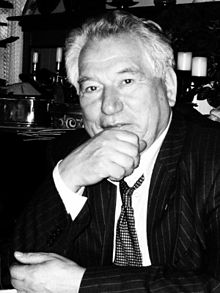Chingiz Aitmatov
| Chinghiz Aitmatov | |
|---|---|

Aitmatov in 2003
|
|
| Born |
12 December 1928 Sheker village, Kirghiz ASSR, Soviet Union |
| Died | 10 June 2008 (aged 79) Nuremberg, Germany |
| Genre | worldlife Fiction |
| Notable works | Jamila |
Chyngyz Aitmatov (Kyrgyz: Чыңгыз Айтматов, Çıñğız Aytmatov, چىڭعىز ايتماتوۋ [tʃɯŋˈʁɯs ɑjtˈmɑtəf]; Russian: Чинги́з Тореку́лович Айтма́тов, Chingiz Torekulovich Aytmatov) (12 December 1928 – 10 June 2008) was a Soviet and Kyrgyz author who wrote in both Russian and Kyrgyz. He is the best known figure in Kyrgyzstan's literature.
He was born to a Kyrgyz father and Tatar mother. Aitmatov's parents were civil servants in Sheker. In 1937 his father was charged with "bourgeois nationalism" in Moscow, arrested and executed in 1938.
Aitmatov lived at a time when Kyrgyzstan was being transformed from one of the most remote lands of the Russian Empire to a republic of the USSR. The future author studied at a Soviet school in Sheker. He also worked from an early age. At fourteen he was an assistant to the Secretary at the Village Soviet. He later held jobs as a tax collector, a loader, an engineer's assistant and continued with many other types of work.
In 1946 he began studying at the Animal Husbandry Division of the Kirghiz Agricultural Institute in Frunze, but later switched to literary studies at the Maxim Gorky Literature Institute in Moscow, where he lived from 1956 to 1958. For the next eight years he worked for Pravda. His first two publications appeared in 1952 in Russian: "The Newspaper Boy Dziuio" and "Ашым." His first work published in Kyrgyz was "Ак Жаан" (White rain, 1954), and his well-known work "Jamila" (Jamila) appeared in 1958. In 1961 he was a member of the jury at the 2nd Moscow International Film Festival. In 1971 he was a member of the jury at the 7th Moscow International Film Festival.
...
Wikipedia
